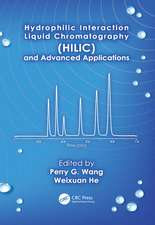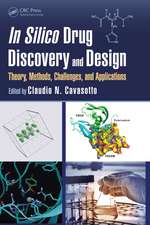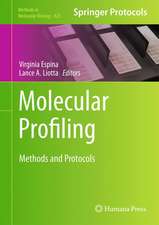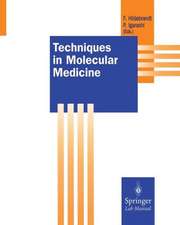Reverse Phase Protein Arrays: From Technical and Analytical Fundamentals to Applications: Advances in Experimental Medicine and Biology, cartea 1188
Editat de Tesshi Yamada, Satoshi S. Nishizuka, Gordon B. Mills, Lance A. Liottaen Limba Engleză Paperback – 8 ian 2021
| Toate formatele și edițiile | Preț | Express |
|---|---|---|
| Paperback (1) | 663.08 lei 38-44 zile | |
| Springer Nature Singapore – 8 ian 2021 | 663.08 lei 38-44 zile | |
| Hardback (1) | 675.97 lei 38-44 zile | |
| Springer Nature Singapore – 19 dec 2019 | 675.97 lei 38-44 zile |
Din seria Advances in Experimental Medicine and Biology
- 9%
 Preț: 719.56 lei
Preț: 719.56 lei - 5%
 Preț: 1113.83 lei
Preț: 1113.83 lei - 20%
 Preț: 691.93 lei
Preț: 691.93 lei - 5%
 Preț: 717.00 lei
Preț: 717.00 lei - 5%
 Preț: 717.00 lei
Preț: 717.00 lei - 5%
 Preț: 715.35 lei
Preț: 715.35 lei - 5%
 Preț: 716.28 lei
Preț: 716.28 lei - 5%
 Preț: 239.86 lei
Preț: 239.86 lei -
 Preț: 642.95 lei
Preț: 642.95 lei - 5%
 Preț: 820.42 lei
Preț: 820.42 lei - 5%
 Preț: 715.71 lei
Preț: 715.71 lei - 15%
 Preț: 640.24 lei
Preț: 640.24 lei - 15%
 Preț: 641.38 lei
Preț: 641.38 lei - 5%
 Preț: 1031.00 lei
Preț: 1031.00 lei - 5%
 Preț: 716.28 lei
Preț: 716.28 lei - 5%
 Preț: 717.20 lei
Preț: 717.20 lei - 20%
 Preț: 1161.71 lei
Preț: 1161.71 lei - 5%
 Preț: 1170.51 lei
Preț: 1170.51 lei - 18%
 Preț: 1119.87 lei
Preț: 1119.87 lei - 5%
 Preț: 1288.48 lei
Preț: 1288.48 lei - 5%
 Preț: 1164.67 lei
Preț: 1164.67 lei - 5%
 Preț: 1101.73 lei
Preț: 1101.73 lei - 18%
 Preț: 1123.67 lei
Preț: 1123.67 lei - 5%
 Preț: 1435.64 lei
Preț: 1435.64 lei - 20%
 Preț: 1044.10 lei
Preț: 1044.10 lei - 18%
 Preț: 946.39 lei
Preț: 946.39 lei - 5%
 Preț: 292.57 lei
Preț: 292.57 lei - 18%
 Preț: 957.62 lei
Preț: 957.62 lei - 18%
 Preț: 1235.76 lei
Preț: 1235.76 lei - 5%
 Preț: 1231.55 lei
Preț: 1231.55 lei - 5%
 Preț: 1292.30 lei
Preț: 1292.30 lei - 5%
 Preț: 1102.10 lei
Preț: 1102.10 lei - 18%
 Preț: 1132.81 lei
Preț: 1132.81 lei - 5%
 Preț: 1165.19 lei
Preț: 1165.19 lei - 5%
 Preț: 1418.48 lei
Preț: 1418.48 lei - 5%
 Preț: 1305.63 lei
Preț: 1305.63 lei - 18%
 Preț: 1417.72 lei
Preț: 1417.72 lei - 18%
 Preț: 1412.99 lei
Preț: 1412.99 lei - 24%
 Preț: 806.15 lei
Preț: 806.15 lei - 18%
 Preț: 1243.29 lei
Preț: 1243.29 lei - 5%
 Preț: 1429.44 lei
Preț: 1429.44 lei - 5%
 Preț: 1618.70 lei
Preț: 1618.70 lei - 5%
 Preț: 1305.12 lei
Preț: 1305.12 lei - 18%
 Preț: 1124.92 lei
Preț: 1124.92 lei - 5%
 Preț: 1097.54 lei
Preț: 1097.54 lei - 15%
 Preț: 649.87 lei
Preț: 649.87 lei - 5%
 Preț: 1097.54 lei
Preț: 1097.54 lei - 18%
 Preț: 945.79 lei
Preț: 945.79 lei
Preț: 663.08 lei
Preț vechi: 697.98 lei
-5% Nou
Puncte Express: 995
Preț estimativ în valută:
126.91€ • 130.79$ • 107.15£
126.91€ • 130.79$ • 107.15£
Carte tipărită la comandă
Livrare economică 25 februarie-03 martie
Preluare comenzi: 021 569.72.76
Specificații
ISBN-13: 9789813297579
ISBN-10: 9813297573
Pagini: 266
Ilustrații: VIII, 266 p. 64 illus., 60 illus. in color.
Dimensiuni: 155 x 235 mm
Ediția:1st ed. 2019
Editura: Springer Nature Singapore
Colecția Springer
Seria Advances in Experimental Medicine and Biology
Locul publicării:Singapore, Singapore
ISBN-10: 9813297573
Pagini: 266
Ilustrații: VIII, 266 p. 64 illus., 60 illus. in color.
Dimensiuni: 155 x 235 mm
Ediția:1st ed. 2019
Editura: Springer Nature Singapore
Colecția Springer
Seria Advances in Experimental Medicine and Biology
Locul publicării:Singapore, Singapore
Cuprins
Chapter 1: Origin and future of RPPA technology.- Chapter 2: Lysate preparation.- Chapter 3: Printing platforms 1.- Chapter 4: Printing platforms 2.- Chapter 5: Analytical platforms 1.- Chapter 6: Analytical platforms 2.- Chapter 7: Analytical platforms 3.- Chapter 8. Antibody screening 1.- Chapter 9. Antibody screening 2.- Chapter 10. Antibody screening 3.- Chapter 11. Integrative analysis for genomics and RPPA.- Chapter 12. Integrative analysis of multiple platforms of RPPA.- Chapter 13. Drug screening platforms and RPPA.- Chapter 14. RPPA in small population analysis.- Chapter 15: Molecular target identification using RPPA.- Chapter 16: RPPA in clinical trials.- Chapter 17: RPPA and future medicine.
Notă biografică
Tesshi Yamada, M.D., Ph.D.
Professor of International University of Health and Welfare, Narita, Japan
Satoshi Nishizuka, M.D., Ph.D.
Professor of Iwate Medical University, Japan
Gordon Mills, M.D., Ph.D.
Professor of University of Texas, MD Anderson Cancer Center
Lance Liotta, M.D., Ph.D.
Co-Director of the Center for Applied Proteomics and Molecular Medicine, George Mason University
Professor of International University of Health and Welfare, Narita, Japan
Satoshi Nishizuka, M.D., Ph.D.
Professor of Iwate Medical University, Japan
Gordon Mills, M.D., Ph.D.
Professor of University of Texas, MD Anderson Cancer Center
Lance Liotta, M.D., Ph.D.
Co-Director of the Center for Applied Proteomics and Molecular Medicine, George Mason University
Textul de pe ultima copertă
This book provides practical guidance on all aspects of reverse phase protein array (RPPA) technology, which permits the quantification of protein levels in cell or tissue lysates. In addition, the latest results are presented from laboratories across the world where experts are successfully running the challenging RPPA data platform. After an introductory chapter by the inventor of the RPPA technique, the demanding task of lysate preparation is explained. Subsequent chapters review printing platforms and analytical platforms and discuss antibody screening in detail. The role of RPPA data in integrative analyses is thoroughly examined, and the various applications of RPPA, for example to identify molecular targeting drugs or evaluate cancer drug efficacy, are discussed with reference to the latest knowledge. It is hoped that the book will foster the implementation of RPPA by documenting the practical details of the technology and by revealing its great potential. It will be of high value for researchers who plan to build an RPPA platform in their institute and for researchers, clinicians, and companies who use RPPA through collaboration with an existing RPPA facility.
Caracteristici
Guidance on handling of samples for stable data generation Explanation of the role of RPPA data in integrative analyses Expert opinions and updates on recent results from RPPA
























